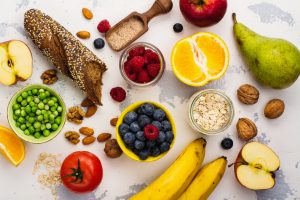You may hear time and again to eat your veggies. In many cases you may have heard this is relation to a heart-healthy diet regimen. However, recent research has shown that increased fiber intake may also have reduce risk of colon cancer.
What is fiber?
 Fiber is an undigested macronutrient in food that comes in two primary forms. Soluble fiber dissolves in water to form a gel-like substance. This type of fiber has been shown to help lower blood cholesterol and glucose levels. Soluble fiber is found in foods such as:
Fiber is an undigested macronutrient in food that comes in two primary forms. Soluble fiber dissolves in water to form a gel-like substance. This type of fiber has been shown to help lower blood cholesterol and glucose levels. Soluble fiber is found in foods such as:
- Starchy vegetables and legumes such as peas and beans
- Fruits such as apples and citrus fruits
- Non-starchy vegetables such as carrots, squash, or beets
- Grain sources such as barley, oats, or psyllium husk
Insoluble fiber does not dissolve in water. This type of fiber has been found to help in bulking stool to help improve waste removal from the body. In turn, insoluble fiber can be helpful for those with constipation. This type of fiber can be found in foods such as:
- Whole grain foods such as whole wheat flour and wheat bran
- Non-starchy vegetables such as cauliflower, broccoli and other leafy greens, or green beans
- Starchy vegetables such as potatoes, beans, or legumes
Fiber and Colon Cancer Research
A recent study looked at data from 1575 patients from the Nurses’ Health Study and Health Professionals Follow-up Study who had colon cancer that did not spread beyond the colon. Researchers looked at fiber intake in the four years after diagnosis. They tried to relate this data with health outcomes during this time.
It was found that for every five grams of fiber consumed, risk of death by colon cancer was reduced by about one-fourth. There is no way to confirm if fiber really helped these patients live longer. However, it is suggested that increased fiber intake after diagnosis could still benefit overall health.
Furthermore, it was suggested by researchers that increased fiber intake may actually reduce risk of getting colon cancer in the first place. This is due to fiber’s ability to lower inflammation in the body that can lead to cell damage and increase risk of chronic disease. However, the study did find though that fiber found in cereal and whole grains had the greatest impact on survival from colon cancer. Supplements and fruit fibers had the least impact on risk of death from any cause. Finally, vegetable fiber intake was linked to a lower risk of death from any cause.
Ways to Eat Better for Gut Health
Fiber not only helps with heart health and improving health outcomes or those with colon cancer. Fiber also helps keeps you more full in between meals and in turn helps manage weight. Furthermore, fiber can help provide good bacteria to your gut, which further promotes a healthy digestive system. More and more research is showing that a healthy gut is the key to lower risk of many diseases and improved overall well-being. Here are some tips to help you eat for better gut health.
- Start your day with a fiber-rich breakfast: Try out quick and delicious fiber-rich breakfast options such as whole grain toast with some avocado and eggs or peanut butter and sliced banana. Oatmeal prepared with milk and flavored with cinnamon and diced fruit is another way to get the most fiber and protein balance in your morning meal.
- Add in fiber-rich snacks throughout the day to curb cravings: In between meals, reach for a 1/4 cup nuts or seeds for some fiber fullness. Also, apple slices with a tablespoon of peanut butter or a few whole grain crackers with cheese can provide the fiber and protein balance your body craves during snack time.
- Keep lunch and dinner meals lean and green: As you get later into the day, focus on lean proteins and green vegetables as your main energy source. Lean proteins could be anywhere from chicken or fish to plant-based proteins such as legumes, tofu, or quinoa. Balance these proteins out with a few cups of leafy greens or other non-starchy vegetable for clean and filling energy for the latter part of your day. Non-starchy vegetables include pretty much any vegetable except for potatoes, corn, and peas.
- Drink plenty of water throughout the day: Water is a necessity to keep the body healthy inside and out. Aim for half of your body weight in ounces in water daily, or at least 64 ounces a day. This fluid intake can include any unsweetened beverage such as unsweetened tea, flavored water, or decaffeinated coffee.
- Add in a gut-friendly probiotic daily: Probiotics can help build good bacteria in your gut. Good bacteria help keep bad bacteria out of your gut, in turn improving digestive health and overall well-being. Add in a probiotic such as Kolonex by Vita Sciences. Kolonex contains a healthy and powerful blend of psyllium husk, probiotics, and bentonite clay that has been shown to support decreased bloating, weight loss, improved bowel transit, waste elimiation, detoxification and increased energy levels.
-written by Staci Gulbin, MS, MEd, RD, LDN
Sources:
Harvard Health Publishing (October 2016) “Can gut bacteria improve your health?”
Mayo Clinic (Sept. 22, 2015) “Dietary fiber: Essential for a healthy diet.”
Medline Health News (November 2, 2017) “Fiber-Rich Diet Boosts Survival from Colon Cancer.”